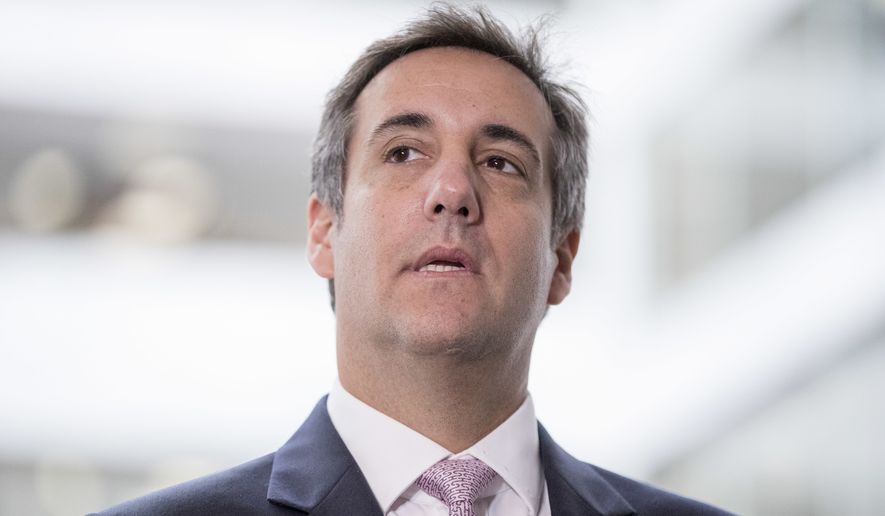Michael Cohen, President Trump’s personal attorney, said in court papers Wednesday he will assert his Fifth Amendment right to avoid self-incrimination in an investigation involving his payment of hush money to porn star Stormy Daniels.
Mr. Cohen said a recent raid by the FBI on his home, office and hotel room have left him fearful of potential criminal charges. He said he was following the advice of his lawyer, who suggested he assert his right to remain silent in the Daniels case.
While Mr. Cohen has not been charged, his decision raised eyebrows.
“This is a stunning development,” said Michael Avenatti, the attorney for the adult-film actress whose real name is Stephanie Clifford. “Never before in our nation’s history has the attorney for the sitting President invoked the 5th Amend in connection with issues surrounding the president.”
He said on Twitter that it was particularly “stunning” given that Mr. Cohen was a “’fixer’ for Mr. Trump for over 10 years.”
Mr. Avenatti also needled Mr. Trump and Mr. Cohen by retweeting as “critically important” a Washington Post article citing Mr. Trump as saying that only guilty people invoke the Fifth Amendment.
The FBI raid, overseen by prosecutors in New York, seized electronic devices and documents reportedly linked to a $130,000 payment Mr. Cohen made to Ms. Clifford, reportedly in October 2016, to silence her about claiming an affair with Mr. Trump a decade earlier. Ms. Clifford has sued the president to get out from under the non-disclosure agreement and also sued Mr. Cohen personally for defamation.
Mr. Cohen is also alleged to have arranged a $150,000 payment from the parent company of the National Enquirer to Karen McDougal, a former Playboy model who also alleged an affair with Mr. Trump.
Election watchdogs have suggested the payments violate federal election laws because they amounted to unreported spending on behalf of a candidate.
Mr. Trump has denied the affair and said he had no knowledge of the payment. On Twitter he called the raids on Mr. Cohen a “disgrace” and “witch hunt.”
Last week, federal prosecutors in New York revealed in court documents that Mr. Cohen has been under grand jury investigation for months for alleged “criminal conduct that largely centers on his personal business dealings.” As part of that investigation, they said they have obtained secret search warrants for multiple email accounts belonging to Mr. Cohen.
But it appears that Mr. Cohen won’t be talking in either investigation.
“Based upon the advice of counsel, I will assert my Fifth Amendment rights in connection with all proceedings in this case due to the ongoing criminal investigation by the FBI and U.S. Attorney for the Southern District of New York,” Mr. Cohen said in the Wednesday court filing.
Mr. Trump’s lawyers say some of Mr. Cohen’s communications with the president may have been ensnared in the raid. They argue those should be protected under the attorney-client privilege, and they want an independent referee to review the files and determine what should be withheld from investigators.
U.S. District Judge Kimba Wood has scheduled a hearing Thursday to sort through the matter.
Deputy Attorney General Rod Rosenstein reportedly signed off on the FBI warrants on Mr. Cohen, based on information provided by Special Counsel Robert Mueller.
Those connections have only heightened the stakes.
Testifying before the Senate Wednesday, Attorney General Jeff Sessions declined to say whether would recuse himself from m his department’s investigation into Mr. Cohen, refusing to confirm reports this week to that effect.
Mr. Sessions also refused to say whether he’s spoken with Mr. Trump about pardoning Mr. Cohen.
Congressional Democrats have speculated Mr. Trump may pardon to Mr. Cohen to protect him from charges should he refuse to cooperate in the investigation into his activities.
Some Democrats have said the president’s pardon earlier this month of I. Lewis “Scooter” Libby, who was convicted of obstruction of justice charges but whose sentence was already commuted by President George W. Bush, was a signal to others that he would protect them from Mr Mueller.
Last August, Mr. Trump pardoned former Sheriff Joe Arpaio of Maricopa County, Arizona, of criminal contempt of court. Mr. Arpaio had been convicted of the crime for refusing to obey a federal judge’s order to stop using racial profiling to target suspected illegal immigrants.
Mr. Sessions defended both pardons, saying Mr. Arpaio was deserving because of his age and the fact that his crimes were misdemeanors, and Mr. Libby had served his country.
The attorney general said neither pardon was reviewed by the Justice Department’s pardon attorney beforehand, though — a break with standard practice.
Mr. Sessions said shortcutting that procedure doesn’t dent the legality of the pardons, since the president’s powers in this matter are absolute.
“The president of the United States clearly has the constitutional power to execute pardons,” Mr. Sessions said.
Mr. Sessions was on Capitol Hill to defend his department’s 2019 budget request, but lawmakers were far more interested in prodding him on administration priorities or asking him to clear up the latest news reports on matters involving his department’s various investigations into figures surrounding Mr. Trump.
Bloomberg reported Tuesday that Mr. Sessions would not step aside from the Cohen investigation. The report said that Mr. Sessions will be able to access briefings on the investigation’s status and voice his opinion on whether to issue subpoenas or indictments. Mr. Sessions may, however, step back from specific questions tied to the probe, Bloomberg said.
• Jeff Mordock can be reached at jmordock@washingtontimes.com.




Please read our comment policy before commenting.